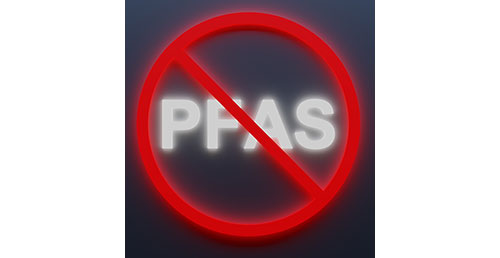September 5th, 2023
Per- and polyfluoroalkyl substances (or PFAS) have been a hot topic of unease among consumers and multiple regulatory agencies; they are commonly referred to as “forever chemicals”. This class of manmade compounds is found in many everyday products such as nonstick cookware, waterproof clothing and grease-resistant food packaging. PFAS are not only extremely long lasting (hence the name) but have been found to be toxic at very low levels and therefore may pose a significant risk to our health.
Unfortunately, suspect chemicals are almost impossible to avoid. They are found everywhere from the tap water in our homes/offices to products such as toilet paper, clothing and food packaging. Additionally, the structure of PFAS defies breakdown in the environment and can take hold, regenerating itself into the consumer cycle. For these reasons and more, we are delving into ways that such substances affect the plastics industry, and how Slide is addressing this vital concern.
The Role of PFAS in Plastic Manufacturing
In the plastic molding industry, forever chemicals have a significant presence due to their purpose and effectiveness in certain types of mold release agents, coatings and processing aids. Products containing PFAS help facilitate the release of molded plastic parts from the molds, thus ensuring smoother operations. However, the same properties that make PFAS effective in this manner also contribute to their persistence within our ecologies.
Challenges Faced by the Plastic Molding Industry
- Natural World Consequences: The plastic molding industry’s reliance of employing PFAS as a common ingredient in mold release composites and coatings heightens trepidations about what negative effects might occur when improperly handling or disposing of them. Any runoff can lead to an unfavorable presence in water bodies or soil, potentially harming aquatic bionetworks and food chains.
- Health Concerns: Beyond an ecological impact, exposure to alkyl substances has been linked to potential human hazards, including developmental/reproductive difficulties, and even certain types of cancers. This is an enigma for both workers in the plastic molding industry and consumers of products made with PFAS.
- Regulatory Changes: As awareness of the environmental and health risks associated with these chemical agents grows, regulatory bodies are taking action. Governments around the world have been implementing restrictions and protocols on the use of PFAS in various applications, including plastic molding. This can lead to changes in certain manufacturing procedures, increasing the industry's need for additional options.

Slide’s Response
In order to properly address the complicated inclusion of products that have positive functional value, yet carry large problematic cons, Slide has carefully reviewed the Toxic Release Inventory list and other resources on per fluorinated and polyfluorinated elements. We are happy to share that Slide’s line of alternative offering is PFAS-free or made within a form or volume that qualifies for the de-minimis exemption. See Slide’s Declaration on PFAS Ingredients listed on available regulatory (TRI) information. Going forward, we will continue to track the situation and keep up to date with new research relating to the effects of these types of chemicals. As always, our customers’ health is a top priority when developing our high-quality products to further benefit plastics manufacturing.





